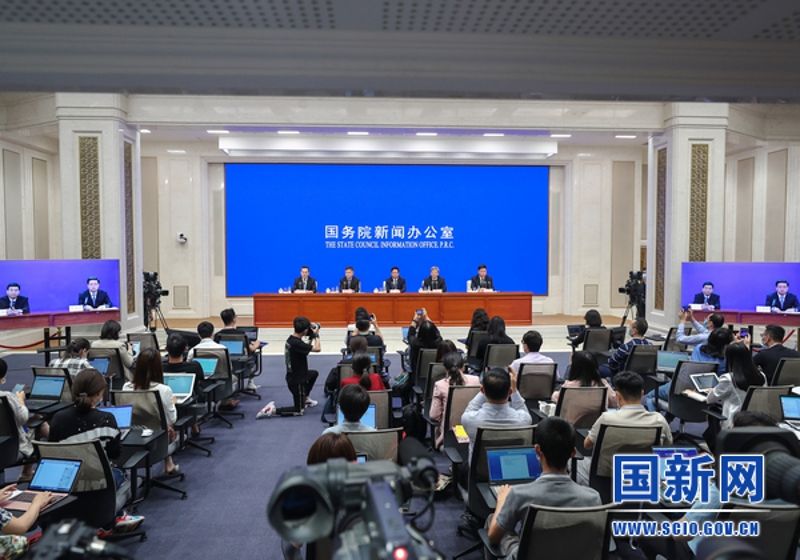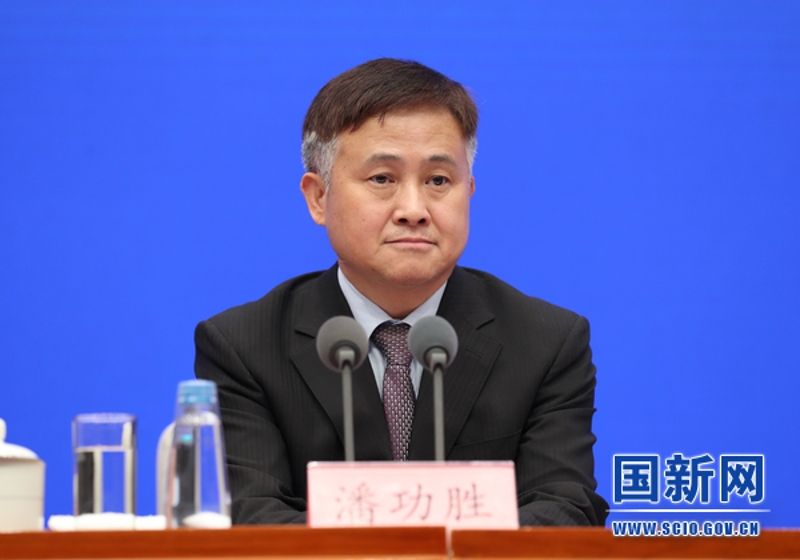The State Council Information Office (SCIO) held a press conference at 3 p.m. on Thursday, September 9, 2021. Attending the conference were Pan Gongsheng, Deputy Governor of the People’s Bank of China (PBC) and Administrator of the State Administration of Foreign Exchange (SAFE), officials from the National Development and Reform Commission, the Leading Group for the Development of the Guangdong-Hong Kong-Macao Greater Bay Area, the Ministry of Finance and the General Administration of Customs, and officials from the governments of Guangdong, Shenzhen, Hong Kong and Macao. They briefed the conference on the development of Hengqin and Qianhai and answered questions. The transcript is as follows.

Journalist with China Daily: To promote financial interconnectivity is important for aligning rules and mechanisms in the Greater Bay Area, and the financial sector is considered a key area to the development of Hengqin and Qianhai. Would you introduce to us the support rendered by the PBC and SAFE for the development of Hengqin and Qianhai? What are the measures newly introduced this time? Thank you.
Pan Gongsheng, PBC Deputy Governor and SAFE Administrator: Thank you for your questions. The PBC and SAFE have attached great importance to the development of the Greater Bay Area. In line with the Outline Development Plan for the Guangdong-Hong Kong-Macao Greater Bay Area issued by the central government, we have been moving ahead with financial opening-up and innovation in the area, including Hengqin and Qianhai.
In May 2020, the PBC and other financial regulators jointly issued the Opinions on Providing Financial Support for the Development of the Guangdong-Hong Kong-Macao Greater Bay Area, in which 26 tasks regarding the priorities in the reform and opening-up of the financial sector are laid out to promote financial opening-up and innovation in the area. Since then, the PBC and SAFE have been advancing the implementation of the financial innovation measures in line with the principle of “balancing short-term and long-term goals and prioritizing financial services closely related to people’s well-being”.
To that end, we have launched a pilot program allowing Hong Kong and Macao residents to remotely open Mainland bank accounts, and will gradually expand its coverage and scale. We have taken measures to facilitate the use of mobile payment by Hong Kong and Macao residents in the Mainland. In addition, we have introduced services for their convenience, such as cross-border direct payment of electronic bills and self-service inquiry on personal credit information. These measures have substantially facilitated people’s lives in the Greater Bay Area.
With regard to market interconnectivity, continued efforts have been made to expand the channels for Hong Kong and Macau investors to invest in in the Mainland capital and bond markets. We have been working on the schemes of Wealth Management Connect and Southbound Bond Connect, which will be officially launched soon.
To promote cooperation on green finance, we have taken active steps to encourage local governments to issue green municipal bonds in Hong Kong and Macao while boosting cooperation between green bond certification agencies in Guangdong, Hong Kong and Macao. With joint efforts, the Guangdong-Hong Kong-Macao Greater Bay Area Green Finance Alliance has been launched.
Moreover, we have launched successively in the Greater Bay Area the pilot programs on the free trade account, cross-border transfer of credit assets, external debt facilitation, cross-border cash pooling and cross-border investment by private equity funds.
Going forward, the PBC and SAFE will continue to implement the decisions and arrangements of the CPC Central Committee and the State Council and to step up financial support for the development of Hengqin and Qianhai.
First, in accordance with the two plans issued by the central government and in order to support the strategic positioning of Hengqin and Qianhai, the PBC is working with financial regulators in Hong Kong and Macao to draft documents specifically on financial support for reform and opening-up in the two zones.
Second, in accordance with Hengqin’s strategic positioning, which is to support Macao by achieving integrated development with it, we will formulate open financial institutional arrangements for Hengqin. We will work towards establishing an electronic fence system and further improve the opening-up of Hengqin’s financial services to financial institutions in Macao so as to achieve the integration of their financial services. We will promote the development of financial businesses with Macau’s characteristics while enhancing the width and depth of Macao’s financial market as well as its financial ties with Portuguese-speaking countries.
Third, we will tap into the potential of Qianhai to strengthen financial cooperation between Shenzhen and Hong Kong and further bring out the role of Hong Kong as an international financial center. Focusing on the issue of free cross-border capital flow, we will promote higher-standard opening-up of the capital account and enhance the opening-up and interconnectivity between financial services sectors in Shenzhen and Hong Kong. Moreover, we will take steps to establish a system of financial rules aligned with international standards, and will improve the financial environment so that it will be market-oriented, law-based and internationalized to play a leading role in the opening-up of China’s financial markets.
Fourth, while expanding opening-up, we will establish and improve the systems for monitoring, preventing and defusing financial risks. We will step up efforts to monitor abnormal cross-border capital flows and will strengthen regulatory cooperation between Guangdong, Hong Kong and Macao on anti-money laundering, counter-terrorist financing and anti-tax evasion efforts so as to improve the effectiveness of the fight against cross-border money laundering and other illegal financial activities. Thank you.
Journalist with Phoenix TV: Hong Kong enjoys advantages in its modern services sector, especially in its financial industry, which is also one of the areas of cooperation between Shenzhen and Hong Kong in the development of Qianhai. What are your considerations for better leveraging Hong Kong’s status as an international financial center and giving play to Qianhai to provide higher-quality financial services for the Greater Bay Area and other parts of the country? Thank you.
Pan Gongsheng: As we all know, Hong Kong is a major international financial center with highly open business environment, a deep financial market system, mature financial infrastructures and an internationalized financial regulatory system. Having been ranked the world’s freest economy for 25 consecutive years, it is the world’s largest offshore RMB market and fifth largest stock market and foreign exchange trading center. It is also Asia’s third largest bond market and largest fund management and personal wealth management center. Since 2019, Hong Kong’s financial market has seen continuous inflows of international capital; its IPO fundraising volumes have been among the highest in the world; and the HKD exchange rate has been stable. All these have consolidated the status of Hong Kong as an international financial center.
In line with the policy of “one country, two systems” and the overall arrangements of the CPC Central Committee and the State Council, the PBC will thoroughly implement the 14th Five-Year Plan and the Outline Development Plan for the Guangdong-Hong Kong-Macao Greater Bay Area. Concerted efforts will be made to give play to the role of Qianhai as a pilot area and demonstration window for expanding financial opening-up as well as the role of Hong Kong as an international financial center in order to provide high-quality financial services for the Greater Bay Area and other parts of the country.
First, we will leverage on Hong Kong’s status as an international financial center to promote RMB internationalization. As an international financial center, Hong Kong is home to many international financial institutions, with RMB funds in Hong Kong amounting to over RMB800 billion, which has rendered significant support for the progress of RMB internationalization. In the future, innovations of cross-border RMB businesses will be put into trial operation in Qianhai. This will help enhance the depth and width of Hong Kong’s offshore RMB businesses and reinforce its position as the world’s largest offshore RMB market.
Second, we will speed up our work to improve the interconnectivity between the Mainland and Hong Kong financial markets. Shanghai-Hong Kong Stock Connect, Shenzhen-Hong Kong Stock Connect and Bond Connect have served as convenient and efficient channels for overseas investors to invest in China’s capital and bond markets. At present, over 70 percent of Mainland stock holdings by overseas investors have been bought through Shanghai-Hong Kong Stock Connect and Shenzhen-Hong Kong Stock Connect. In the future, the Qianhai cooperation zone will be positioned to pioneer the programs on interconnectivity between the Mainland and Hong Kong financial markets.
Third, we will promote cooperation between the Mainland and Hong Kong in such fields as green finance, sci-tech finance, Fintech, financial innovation and financial regulation.
Fourth, Qianhai will be the pilot ground for implementing the negative list of the financial sector and aligning existing rules with international standards. We will take steps to establish a system of financial rules aligned with international standards and promote the integrated development of financial rules so that it will play a leading role in the opening-up of China’s financial markets. Thank you.



